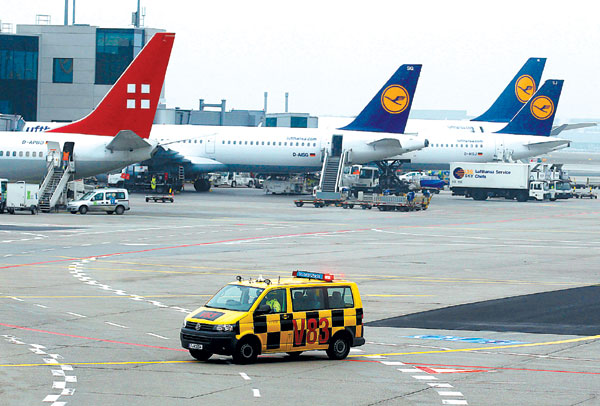China welcomed a European Union decision not to immediately charge airlines that use airports within EU borders for their carbon emissions in the hope that a better system can be devised.
Connie Hedegaard, EU climate commissioner, said on Monday the EU will put its emissions rules applying to overseas airlines on hold for a year if the United Nations' International Civil Aviation Organization can agree on an alternative way to curb emission increases.
 |
|
An airport vehicle drives past aircraft at the airport in Frankfurt, Germany. The European Union said on Monday that it will freeze its rules on air-carbon taxes for a year to let an alternative plan to help curb rising airline emissions be agreed on. ALEX DOMANSKI / REUTERS |
Li Gao, deputy director-general of climate change at the National Development and Reform Commission, said the move was "a step in the right direction".
"This result was reached under pressure from all interested parties and fully shows that unilateral measures are not a good way to deal with climate change issues," Li said.
The EU, because of its insistence that overseas airlines using airports within its borders come under its emissions trading system, has been the subject of intense international pressure as of late.
The United States, Russia, China, India and other countries have all expressed strong opposition to the emissions rule.
Xia Xinghua, deputy director of the Civil Aviation Administration of China, said the UN International Civil Aviation Organization is the best forum for discussing these matters.
Speaking at a news conference on Tuesday, Hong Lei, Foreign Ministry spokesman, said China is happy with the EU's decision to suspend its unilateral measures.
"China always maintains that... it will continue to work with all of the parties involved to deal with climate change using a multilateral mechanism such as the UN Framework Convention on Climate Change and the International Civil Aviation Organization," he said.
The aviation organization said on Friday to look for ways to encourage the use of market-based mechanisms to reduce carbon emissions. It suggested adopting a carbon-trading system but has yet to say it intends to put one into effect.
The EU's decision to freeze its emissions rule will not apply to EU's airlines. Only international flights will be exempt from paying for their carbon releases during the year-long suspension period.
The original rule would have allowed the EU to charge international airlines using EU airports for carbon emissions from Jan 1 onwards. The airlines' first payment under the system was to come due in April 2013.
Estimates suggest that complying would have initially cost China's aviation industry about 800 million yuan ($126 million) a year and as much as 18 billion yuan a year by 2030.
Hedegaard called on the aviation organization to propose an alternative way of controlling airline emissions. Otherwise, she said, the EU will revert to its original plan.
"But let me be very clear: If this exercise does not deliver — and I hope it does — then, needless to say, we are back to where we are today with the EU emissions trading system, automatically," Hedegaard was quoted as saying by Reuters.
Yang Fuqiang, a senior adviser on energy, environment and climate change at the Natural Resources Defense Council, said the fact that the suspension lasts for only a year will put policymakers under great pressure to come up with an alternative.
"A year may not be enough for the International Civil Aviation Organization to reach a global deal," he said. "The talks may take more time."
Chen Juming, senior vice-president of the aircraft maker Airbus China, welcomed the EU's decision.
Chen said Airbus believes the parties debating the proposed emissions trading system can arrive at a solution by next fall, when the International Civil Aviation Organization will hold a conference.
"Only a plan from the aviation organization will lead to a real solution," he said.
He declined to say if the EU's decision will lead to a resumption of orders that China had put on hold. Airbus confirmed in March that the country had suspended approvals for $12 billion worth of Airbus orders, including orders for 35 of the company's A330 planes and 10 of its A380s.
Zhao Shengnan contributed to this story.
Contact the writers at [email protected] and [email protected]
